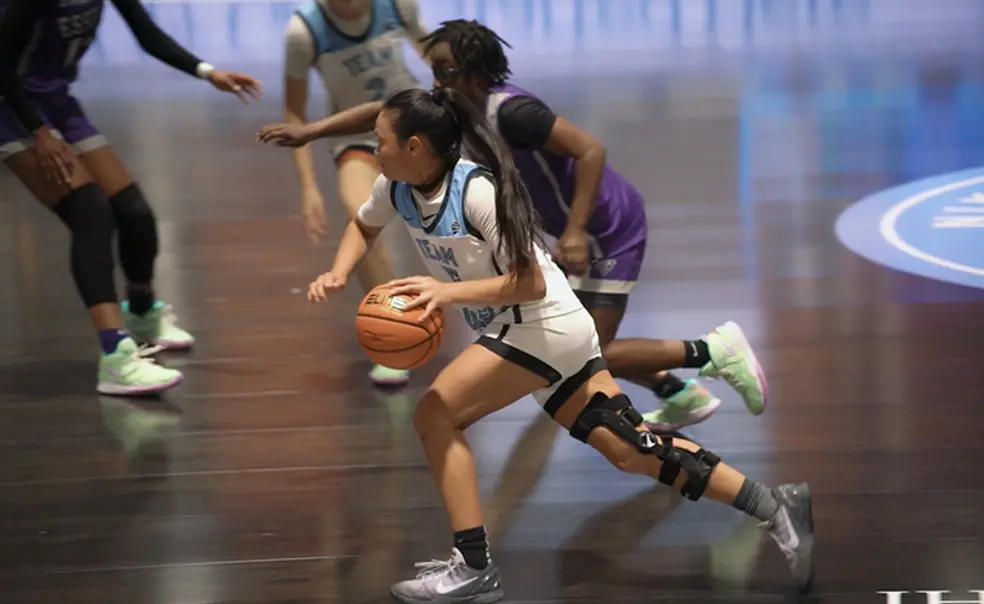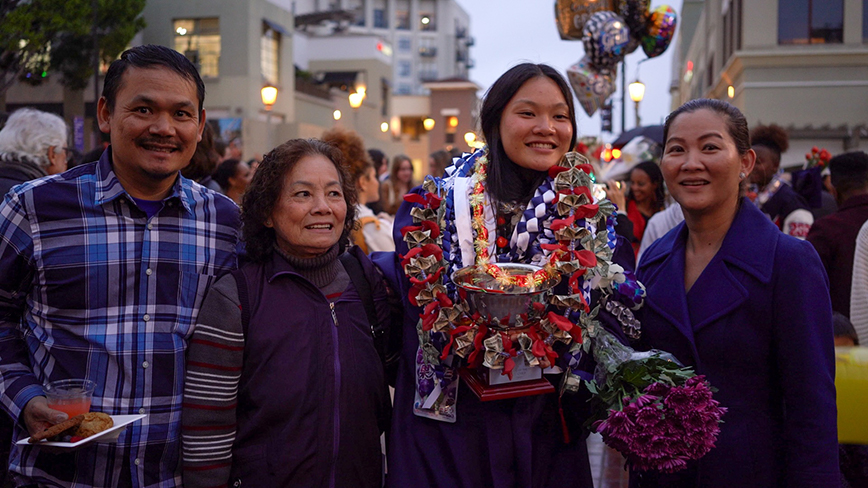Basketball Star Ashley Chea ’27 Shines in New PBS Documentary
Home Court airs March 24 as part of PBS’s Independent Lens series
Early in the documentary Home Court, high school girls’ basketball coach Jayme Kiyomura Chan explains why she made a bold request of the headmaster at her school, Flintridge Prep of Los Angeles, in 2019. If Flintridge were to offer tuition assistance to a 15-year-old Cambodian American basketball prodigy, she argued, the school would alter the educational prospects of one immigrant family for generations to come. Flintridge could have this impact, the coach emphasizes, “with this one child.”
“This one child” was Ashley Chea ’27, who’s now leading the Tigers in minutes, points, and assists, while shooting 37.1% from beyond the three-point arc. Video of her cold-blooded buzzer-beater to defeat Harvard on Jan. 11 went viral, but it pales next to a shot she sank as a Flintridge senior. That clip — of a look-away, walk-off three-pointer à la Steph Curry — has amassed 6.8 million views online and features in Home Court, for which Chea and her parents allowed filmmakers to document her final three years of high school. The film airs on March 24 as part of PBS’s Independent Lens series.
Director Erica Tanamachi and her crew capture Chea tearing a posterior cruciate ligament at the start of her sophomore season in high school and follow her through a lengthy, COVID-inflected rehab. A directional mic picks up in-game audio, including of Chea reassuring herself through wobbly moments with mantra-like incantations. And the film witnesses the drama of her final year, when she turns the heads of college coaches at the summertime Nike Nationals with her travel team (which includes Burmese American Skye Belker ’27, a future Princeton teammate) and leads Flintridge to its preseason goal, a California Interscholastic Federation regional title. While pacing in front of Nassau Hall during her official visit to campus, she tells her conflicted parents that she wants to attend college at the opposite end of the country. Tanamachi points out the irony: “We talk about ‘the model minority’ that pushes so hard to succeed, and then it’s a sad point in the film when Ashley is choosing ... Princeton?”
Chea admits to having been “cringed out by who I was” upon first seeing a rough cut: emotionally fragile, picking up a technical foul for dropping an f-bomb, and walling herself off from teammates, even as a captain. Most poignant are her starkly different relationships with each parent. Her dad, Baov, loves basketball as much as she does, having played for years in Asian American rec leagues. He found an eager student in his daughter, whom he began training from age 6, and who fatefully caught the eye of a scout for a club team while shooting and dribbling at halftime of one of Baov’s games. By contrast her mom, Lida, is a taskmaster who regards playing sports as “wasting time” and grounds her daughter for flunking a quiz. At the same time, Lida is at sea in the wealthy, privileged world of Flintridge Prep, which she “doesn’t understand” even as she’s otherwise eager to assimilate. “That’s the beauty and the heartbreak,” Tanamachi said.
Home Court operates on several levels. It’s a longitudinal immigrant story, a kind of Hoop Dreams for a changing America, featuring a leading lady who plays with swagger and joy. “Ashley has star quality,” said Tanamachi, who first met Chea at a send-off-to-college party for Kaitlyn Chen ’24, then a Flintridge senior bound for Princeton.
The film is also a character study of a complex adolescent who alternately craves solitude to work on her game, yet needs the company of others lest she get anxious and fidgety. “She has a brother who’s much younger, so she was more or less an only child,” said Princeton coach Carla Berube. “She really leans into friendships. She even likes to study with other people.”
And Home Court is the rare film about the Cambodian diaspora that only glancingly touches on the genocide of the late 1970s. Chea’s paternal grandmother, Sue Nigm Ngoy, recounts in the film how, as a girl back in Cambodia, she took to a bicycle to escape Khmer Rouge gunmen, who fired at her as she fled. For Chea, to be born in the U.S. comes with the privilege of being oblivious to that story until her grandmother shared it on screen.
But Home Court is also an unabashed celebration of Asian American hoops. Chea recounts overhearing an opponent who said her Asian club “should go back to wherever they came from.” Never mind that every player was born in California, and that within five minutes of tipoff this other girl’s team wound up trailing Chea’s by double digits. Nor is it lost on Chea that the most electrifying men’s player on campus right now, Xaivian Lee ’26, is of Korean descent. “It’s super inspiring,” she said. “He and I both truly care about where we come from.”
With the film’s impending release, Chea squirms at having to answer for a less-mature version of herself. But it’s worth it for the chance to represent and motivate — to hasten a future when, as she puts it in the film, “If I don’t play well, it’s not because I’m Asian, but because I’m just having a bad day.” For Chea, to sit through a festival screening of Home Court in L.A.’s Little Tokyo last May “made me realize the effect I could have on so many kids, especially girls, especially Asian Americans. And I felt awe at how many people truly cared about me and wanted to support me.”
As Chea plots her remaining course of study — she intends to concentrate in psychology while pursuing a certificate in entrepreneurship — Baov and Lida remain in L.A., raising her brother Ethan, now 6. They still run their donut shop in Pico Rivera, which is staffed 13 to 17 hours a day, seven days a week. They catch their daughter on ESPN+ when they can.













No responses yet